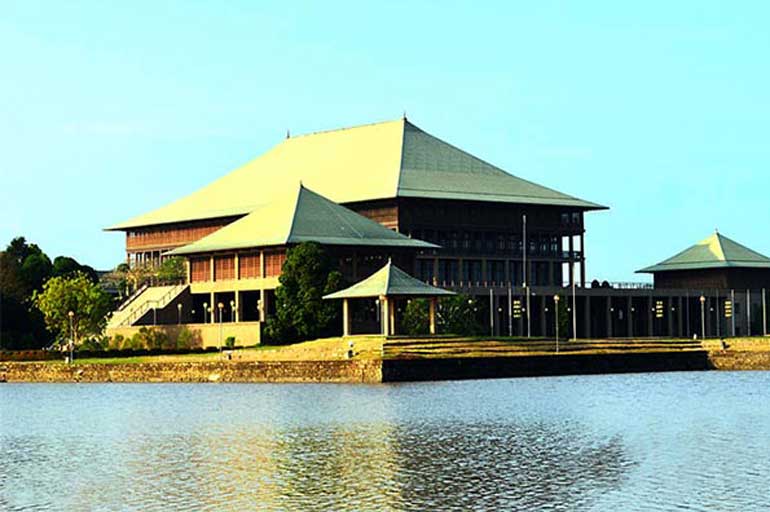Sunday Feb 22, 2026
Sunday Feb 22, 2026
Friday, 1 July 2016 00:00 - - {{hitsCtrl.values.hits}}
 The original purpose of the National List was to ensure that Sri Lankan Parliament saw the appointment of educated men and women with professional and/or academic experience who may be able to contribute towards the development of sound and consistent policy for the country’s benefit
The original purpose of the National List was to ensure that Sri Lankan Parliament saw the appointment of educated men and women with professional and/or academic experience who may be able to contribute towards the development of sound and consistent policy for the country’s benefit
The 14th Amendment to the Constitution of the Democratic Socialist Republic of Sri Lanka was enacted on 24 May 1988 by  Parliament under the presidency of J. R. Jayewardene and premiership of R. Premadasa. This amendment saw the expansion of the number of Members of Parliament from 196 to 225, the extra 29 to be appointed via a procedure known as the ‘National List,’ whereby elected parties are given a proportion of said 29 seats according to the number of votes they have polled in popular election.
Parliament under the presidency of J. R. Jayewardene and premiership of R. Premadasa. This amendment saw the expansion of the number of Members of Parliament from 196 to 225, the extra 29 to be appointed via a procedure known as the ‘National List,’ whereby elected parties are given a proportion of said 29 seats according to the number of votes they have polled in popular election.
A system to bring professionals into the legislative process
For a while now, the National List has been a bone of contention for the people of Sri Lanka, and once again, its importance was highlighted at recent general elections held in 2015.
The original purpose of this allowance was to ensure that Sri Lankan Parliament saw the appointment of educated men and women with professional and/or academic experience who may be able to contribute towards the development of sound and consistent policy for the country’s benefit. Such professionals may not have had the same opportunities to garner public support in the same way as fellow career politicians, yet these professionals were recognised as having an equally important role to play in steering legislative change in a positive direction.
Other countries around the world have looked to a second chamber or ‘Upper House’ in parliament to similarly enable intellectuals, although the systems of election or appointment vary between countries – examples include the US Senate, British House of Lords and Indian Rajya Sabha.
Whilst in theory the establishment of the National List should be viewed as a positive development and as an improvement on traditional democracy in its crudest form, in this article I argue that the current provisions for the National List process are inadequate and are failing the people of Sri Lanka.
One of the reasons for this statement is the current abuse of this process to enable the appointment of candidates that have failed to be elected, or perhaps more strongly, have been outright rejected, by the direct democratic process. Recent examples at the 2015 General Election include Thilanga Sumathipala, S.B. Dissanayake, Mahinda Samarasinghe and Lakshman Yapa Abeywardena, all of whom ran in their respective districts in the General Election, but were unable to secure a sufficient number of preferential votes to gain them a seat in Parliament.
A broken system
Due to the nature of the National List process, appointments are not made through a direct democratic process but by the secretaries of the respective political parties. The system is intentionally designed this way so as to circumvent the need for electoral success. This, however, creates a vulnerability in the system that engenders a reliance on a moral onus on the part of party secretaries to nominate candidates that they believe to be appropriate for the purpose and spirit of the National List.
These candidates are appointed to Parliament through a privileged process, and must importantly possess the relevant professional, spiritual or academic attainment that is in the best interests of the people, so as to validate the circumvention of traditional electoral safeguards, i.e. being directly voted into office. To permit those who not only have been rejected by the people through a direct democratic vote but those who are also traditional career politicians with little to show for professional expertise in any given subject area goes against the very grain of this democratically privileged process, and is nothing but a perversion of the ideals that led to the creation of this system.
Where do we go from here?
It is important to recognise the need for a reflective learning cycle within the Sri Lankan governance system. The proportional representation system of election is currently under much scrutiny, with a proposed Constitutional amendment reforming the electoral system currently in the works. Adequate systems must be in place to prevent a similar situation occurring as with what happened when the 18th Amendment was enacted, whereby core and essential democratic checks such as limits on terms of power were successfully removed.
How do we stop this from happening again? Given the recent discussions regarding the potential implementation of a new Constitution, the time is right to have a frank discussion about the National List and how legislation can be implemented to ensure that the process functions according to original intended desire. This is one of the vital building blocks in the creation of a robust system of checks that is less vulnerable to abuses that have slipped through in the past.
Potential legislative safeguards
It is clearly evident that a ‘moral onus’ as such is not enough to prevent the National List appointment process from being abused by political party leaders. There is a clear rationale for the implementation of potential legislative measures, such as the prevention of candidates who have run for General Election from being simultaneously permitted to enter Parliament via the National List in the event of being unsuccessful. The National List is not a ‘few extra seats’ for each party, but has a very specific and important purpose.
Furthermore, it may be prudent to create the need for an additional check on candidates nominated by parties, in the form of an approval by a President, Constitutional Council or other independent body, in the spirit of verifying professional expertise and contribution towards society.
In addition, there is a case to be made for a minimum level of educational attainment to be stipulated when entering Parliament through the National List. This is, after all, the reason why this system was created. Detractors may argue that this policy is discriminatory – why should someone who has been deprived of an education be deprived this opportunity? The reality, however, is that the National List is a democratically privileged process. It gives priority to those who, through their professional expertise, are able to serve more effectively in the best interests of the country.
It is facile to argue that this system as a whole is discriminatory, as anyone of any socioeconomic background is free to run for General Election, regardless of education. The National List is not ‘just another way into Parliament’, but a system that needs to be closely monitored and secured in any event of compromise. It is a system that exists to take our country forward more effectively and safely, but in its current state of vulnerability, is being exploited by unscrupulous individuals in a gross perversion of our democratic system. In a time of potential Constitutional upheaval, it’s time to strike whilst the proverbial iron is hot.
(The writer, MA (Cantab) MB BChir, is a Cambridge-educated medical doctor and research scientist. Malinga is a former Head Prefect of Colombo International School and a past President of the Cambridge University Sri Lanka Society.)